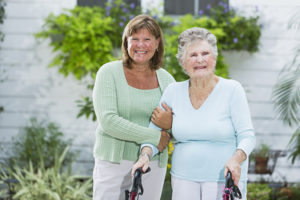June 6, 2018

Learn the skills you need to provide better care for your senior loved one.
If you’re a caregiver for a senior loved one, it is likely that you fell into the responsibility without any formal training: you saw the requirement, and gallantly came forward to fulfill it. Yet, at Continuum, comprehensive training is provided to each of our St. Louis home care professionals before they’re fully equipped to properly and effectively provide in-home caregiving services for older adults. In our efforts to empower family caregivers, we’ve detailed examples of the crucial skills necessary to give the highest quality senior care.
Nutrition: Ensuring necessary nutrition in the elderly is complicated. Medication side effects can lead food to be less enjoyable. Chewing and swallowing could be issues. And loneliness or depression might have a critical effect on appetite. The fact is, senior malnourishment is increasingly common in older adults, and isn’t as simple as observing whether a senior has lost weight. Speak with the senior’s physician or a dietitian to set up a nutrition plan, and make sure the senior’s fluid consumption (particularly plain water) is ample – a minimum of 8 to 10 glasses of fluid per day.
Infection Control: Being in close contact with a senior through providing personal care increases the risk for spreading viral and bacterial infections. The best defense against infection is keeping hands clean. Even if using protective gloves, hands should still be washed thoroughly with soap and hot water, both before applying and after removing gloves.
Communicating: Communicating with your senior loved one may seem like second nature, but there are lots of key points to consider that can help the person feel more secure and to prevent damaging his or her self-esteem. Seniors should always be spoken to in a respectful manner – never being patronizing or demeaning. Asking open-ended questions and allowing the senior enough time to answer thoroughly without interrupting, are important communication recommendations. If the senior has dementia or Alzheimer’s disease, keep from correcting him, especially if the topic being discussed heightens emotional responses such as anxiety or aggression.
Documenting: Maintaining good records of changes noted in the senior’s condition, and providing information to the healthcare team immediately, is key to making sure your loved one has all of the information needed to manage any possible concerns. Note dates, times, and as many specifics as possible – physical changes including increased pain, numbness, swelling, etc., as well as any modifications in behavior and disposition.
Want more caregiver tips from our fully trained and highly skilled care team, or a partner in care to deliver hands-on help for your senior loved one? Our St. Louis home care team is available to partner with family caregivers to make certain seniors have the highest possible quality of care all the time. Contact Continuum at (314) 863-9912 to discover more.
